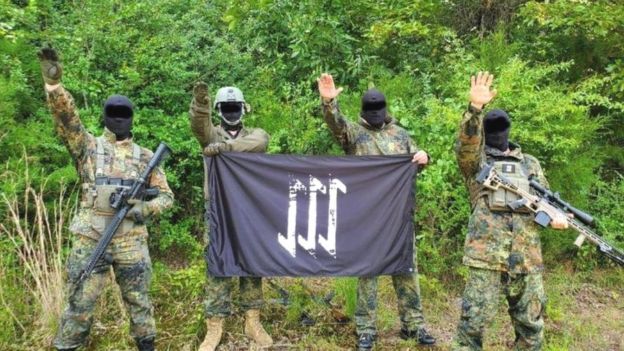You are using an out of date browser. It may not display this or other websites correctly.
You should upgrade or use an alternative browser.
You should upgrade or use an alternative browser.
RUSSIA 🇷🇺 Thread: Wikileaks=FSB front, UKRAINE?, SNOWED LIED; NATO Aggression; Trump = Putins B!tch
- Thread starter ☑︎#VoteDemocrat
- Start date
More options
Who Replied?
Interview with Edward Snowden: 'If I Happen to Fall out of a Window, You Can Be Sure I Was Pushed' - SPIEGEL ONLINE - International
:moscowmjpls:
@88m3 @ADevilYouKhow @wire28 @dtownreppin214
@DonKnock @dza @wire28 @BigMoneyGrip @Dameon Farrow @re'up @Blackfyre @Cali_livin @NY's #1 Draft Pick @Skyfall

Former head of bank unit at heart of a €200bn money-laundering scandal found dead
Former Head of Danske Bank in Estonia Is Found Dead in Suicide
nytimes.com
Former Head of Danske Bank in Estonia Is Found Dead in Suicide
By Jack Ewing
6-7 minutes
Image

Danske Bank’s branch in Tallinn, Estonia, in 2018.CreditCreditInts Kalnins/Reuters
- Sept. 25, 2019Updated 2:12 p.m. ET
But when investigators revealed last year that customers from Russia and Eastern Europe had used the Danske subsidiary to launder billions of dollars in dirty money, Mr. Rehe inevitably shared the blame. The money laundering, from 2007 to 2015, took place on his watch.
On Wednesday, Mr. Rehe was found dead, an apparent suicide, in his backyard in Tallinn, the Estonian police said.
Mr. Rehe, 56, had been the focus of an intensive search since Monday when his family reported him missing from his home.
Mr. Rehe’s death is another twist in the money-laundering scandal, which prompted a criminal investigation and forced Danske Bank, Denmark’s largest lender, to withdraw from Estonia and other Baltic countries.
The police said there was no sign of foul play, and prosecutors said Mr. Rehe was not a suspect in their criminal investigation of the money laundering. Still, his death focused renewed attention on money-laundering allegations that have tainted the previously upright image of Scandinavian banking; led to official investigations in Sweden, Germany and the United States; and even threatened the economies of the Baltic countries.
The scope of the investigations widened Wednesday when prosecutors in Frankfurt confirmed that they were investigating Deutsche Bank’s role as an intermediary that helped Danske Bank process transactions in United States dollars for suspect customers. The New York Times has reported that Danske Bank was part of a federal investigation of whether Deutsche Bank complied with laws meant to stop money laundering and other crimes.
A team of about a dozen investigators visited Deutsche Bank headquarters in Frankfurt on Wednesday and collected documents. “Deutsche Bank has comprehensively examined the facts of the matter and has voluntarily provided the requested documents as far as possible,” the bank said in a statement. “The bank will continue to cooperate with the prosecutor.”
The action in Frankfurt was not on the same scale as prominent raids in the past when the police arrived in dozens of vehicles unannounced and seized boxes full of documents. But it was a reminder that Deutsche Bank remained under close scrutiny for alleged lapses of the past, even as it tries to address chronically poor profits.
In Tallinn, as many as 50 police officers and volunteers had searched for Mr. Rehe before his body was found Wednesday morning, the authorities said. He had left his home without his cellphone or wallet, and the police considered him a suicide risk. Mr. Rehe’s family had previously searched the area where he was found, said Marianne Ubaleht, senior press officer for the Estonian Police and Border Guard.
The police are not investigating Mr. Rehe’s death further, according to a police statement. Ms. Ubaleht would not comment on how Mr. Rehe had died. The police were still investigating what he had done and where he had gone between Monday and Wednesday, she said.
Mr. Rehe was not considered a suspect in the criminal investigation, a spokeswoman for Estonian prosecutors said. However, he supervised the bank from 2006 to 2015, and from 2007 to 2015 there were “major deficiencies in controls and governance that made it possible to use Danske Bank’s branch in Estonia for criminal activities such as money laundering,” the bank said in a 2017 statement.
Previously, Mr. Rehe was director general of Estonia’s Tax and Customs Board, according to the Postimees newspaper in Tallinn. He later worked for another Estonian lender, Bigbank, but had left in November, Postimees said.
He told the newspaper in an interview in March that he believed Danske Bank’s money-laundering controls had been adequate.
Swedish banks, once considered to be some of the best managed in Europe, have since been swept up in the scandal. In April, the two highest-ranking executives of Swedbank resigned under pressure after Swedish television reported that the bank was under investigation by the New York State Department of Financial Services.
The New York regulators had questioned Swedbank’s New York subsidiary about transactions involving Ukrainian politicians accused of corruption, Russian businessmen, offshore companies, and banks in Ukraine, Cyprus and other countries that have been considered money-laundering hubs.
Swedish regulators have disclosed that they are also investigating how SEB, another major Swedish bank, manages money-laundering risks in Estonia, Latvia and Lithuania. An SEB spokesman said the bank was being scrutinized because it had extensive operations in the Baltics, not because there were any specific allegations of wrongdoing.
Faced with intense regulatory scrutiny, many European and American banks have decided that Latvia, Estonia and Lithuania are too risky and have cut ties. That is a problem for the Baltic economies, potentially raising the cost of credit and making it more difficult for local banks to conduct transactions in dollars.
Typically, the smaller local banks need a partner with international reach, a so-called correspondent bank, to handle dollar transactions. Correspondent banks that worked with Danske Bank’s Estonian branch began raising questions about suspicious transactions as early as 2010, the bank’s internal investigation said, but managers failed to take effective action.
At least one correspondent bank, which is not named in the report, stopped doing business with Danske in Estonia in 2013 because of concern about money laundering. Deutsche Bank did not terminate its relationship with Danske until 2015.

@88m3 @ADevilYouKhow @wire28 @dtownreppin214
@dza @wire28 @BigMoneyGrip @Dameon Farrow @re'up @Blackfyre @Cali_livin @NY's #1 Draft Pick @Skyfall
bbc.com
US neo-Nazi directing group from Russia, BBC finds
By Daniel De Simone, Andrei Soshnikov & Ali Winston BBC News
6-7 minutes

Image caption Rinaldo Nazzaro is now living in Russia
The American founder of US-based militant neo-Nazi group The Base is directing the organisation from Russia, a BBC investigation has found.
Rinaldo Nazzaro, 46, who uses the aliases "Norman Spear" and "Roman Wolf", left New York for St Petersburg less than two years ago.
The Base is a major counter terrorism focus for the FBI.
Seven alleged members were charged this month with various offences, including conspiracy to commit murder.
Paramilitary training
Court documents prepared by the FBI describe The Base as a "racially motivated violent extremist group" that "seeks to accelerate the downfall of the United States government, incite a race war, and establish a white ethno-state".

Image caption Members of "The Base" posed for photos that were used as propaganda
The group - founded around July 2018 - gains followers online, communicates using encrypted messaging applications, and encourages members to engage in paramilitary training.
The leader's real identity had long been a mystery.
However, multiple images and videos of Nazzaro - taken over several years in both the USA and Russia - show the man known to be The Base founder, who goes by the two aliases.
He has previously used photographs of himself when promoting the group online
Last year Nazzaro was listed as a guest at a Russian government security exhibition in Moscow, which "focused on the demonstration of the results of state policy and achievements".
Living in Russia
A video posted online in March 2019 shows Nazzaro in Russia wearing a t-shirt bearing an image of President Vladimir Putin along with the words "Russia, absolute power".
We traced Nazzaro and his Russian wife to an upmarket property in central St Petersburg purchased in her name in July 2018 - the same month to which the FBI dates the creation of The Base.
Image copyright YouTube
Image caption Nazzaro was filmed in Russia wearing a T-shirt depicting President Vladimir Putin
Records show that, before moving to Russia, Nazzaro ran a company registered in New York that offered access to a "network of security professionals" with expertise in intelligence, counterterrorism, counterinsurgency, and psychological operations.
A website for the firm - Omega Solutions - once stated: "Our associates have worked with various government and military agencies, including multiple wartime deployments to Iraq and Afghanistan".
When we visited the company's one-time address it was little more than a mail drop, although the firm officially remains active and has a current insurance policy.
Property records show that an apartment associated with Nazzaro in New Jersey was given as the address for an entity called "Base Global" when it purchased land in the US state of Washington.
Guerrilla warfare
Nazzaro married a Russian woman in Manhattan in 2012. She had moved to the city from her homeland around four years earlier and her CV says she spent time working in a bank.
In 2018 - when he first began promoting The Base online using the "Norman Spear" pseudonym - they moved with their children to Russia.
Image copyright GAB
Image caption Nazzaro used the pseudonym "Norman Spear" to recruit on social media in 2018
In social media posts that year, "Norman Spear" posted imagery and videos by the outlawed British terrorist group National Action, praised al-Qaeda, and asked for volunteers possessing various skills, including with weapons, for his new organisation.
Audio recordings posted online capture "Spear" lecturing on subjects such as "guerrilla warfare". He is variously described as a military veteran, a former CIA field officer, and a defence studies expert.
"Norman Spear" was previously associated with an obscure movement that seeks a "white homeland" in the US Pacific Northwest, which includes the area where "Base Global" purchased land.
Following the nationwide FBI arrests of alleged Base members last week, an online channel used by the group to post propaganda carried a defiant statement from "Roman Wolf", saying "we will continue our struggle for survival undeterred".
The case against three alleged members states that the group leader instructed them to use coded language - or cyphers - when communicating, a tactic which the men are said to have employed.
The trio, accused of conspiring to murder an anti-fascist couple and their children, were allegedly counselled by the leader to carry out "non-attributable actions but that will still send a message".
A separate Guardian investigation has today also named Nazzaro as leader of The Base.
@88m3 @ADevilYouKhow @wire28 @dtownreppin214
@dza @wire28 @BigMoneyGrip @Dameon Farrow @re'up @Blackfyre @Cali_livin @NY's #1 Draft Pick @Skyfall


